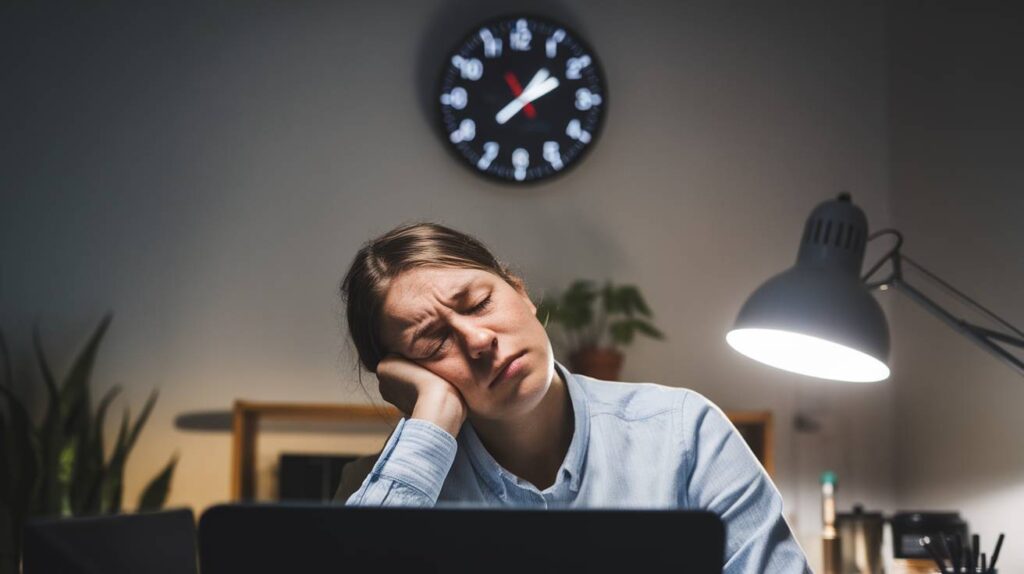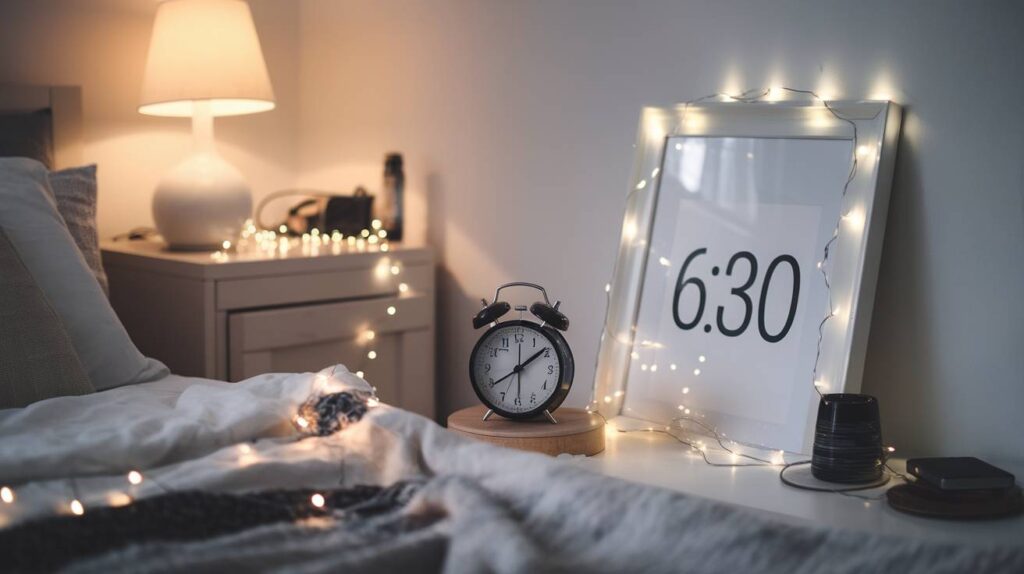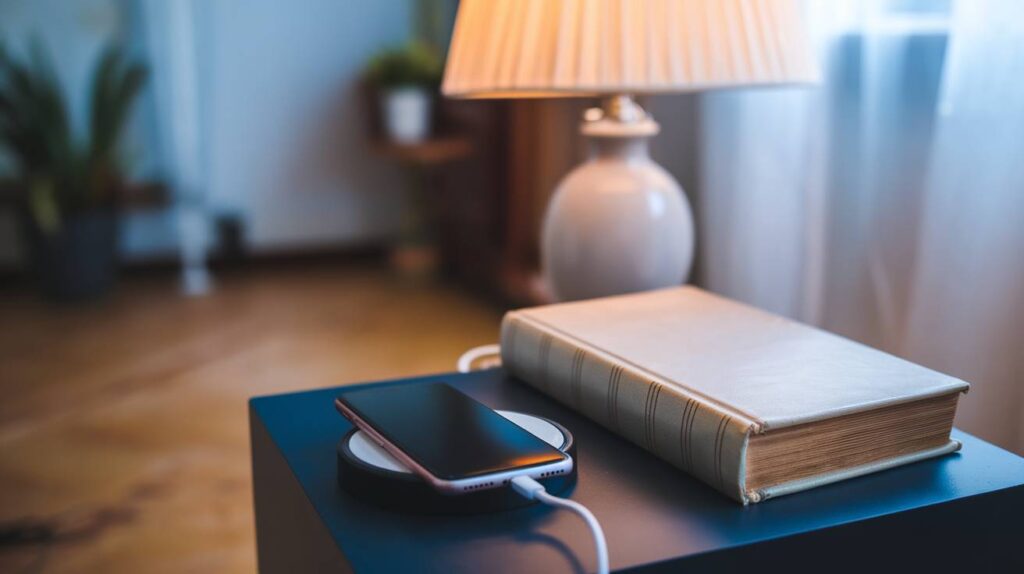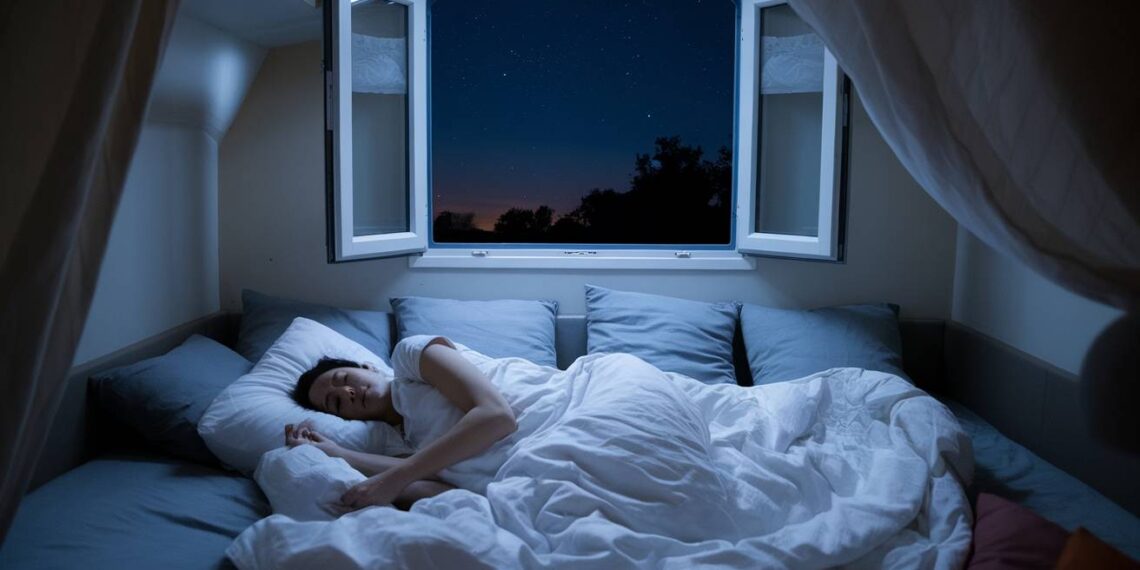Entering your 30s often means juggling career ambitions, family responsibilities, and a busy social life. Amidst this hustle, getting quality sleep can become a challenge. But restful nights are crucial for maintaining energy, focus, and overall health.
If you’re finding it hard to wind down, it’s time to prioritize sleep and make some changes. Let’s explore effective tips tailored for those in their 30s to help you say goodbye to sleep struggles and embrace rejuvenating rest.
Key Takeaways
- Understand the Importance of Sleep in Your 30s: Quality sleep supports physical health, mental clarity, and emotional balance during this busy decade.
- Establish a Consistent Sleep Routine: Setting regular bedtimes and wake times helps regulate your body’s internal clock.
- Create a Relaxing Sleep Environment: A comfortable, quiet, and dark bedroom promotes better sleep.
- Mind-Body Connection: Manage stress and anxiety through relaxation techniques to improve sleep quality.
- Adopt Healthy Lifestyle Habits: Regular exercise, a balanced diet, and proper hydration contribute to better sleep.
- Manage Technology Use: Limit screen time before bed and leverage sleep-friendly technology when appropriate.
- Seek Support When Needed: Consult professionals for persistent sleep issues and connect with supportive communities.
- Adjust Sleep Patterns for Lifestyle Changes: Learn strategies to handle shift work and optimize napping.
- Monitor Sleep Quality: Track your sleep patterns to identify issues and make informed adjustments.
Understanding Sleep in Your 30s
Alright, so you’re in your 30s. Yay! Along with the thirties come all sorts of cool and not-so-cool extras like bustling careers, maybe some diaper changes, or late-night Netflix binges. Figuring out how everything, including sleep, fits into this decade can be a maze!

Why Hitting the Snooze Button Matters in Your 30s
Getting good sleep isn’t just about feeling less like a zombie. It’s clutch for keeping our bodies and minds in tip-top shape. Decent snooze time can boost your immunity, help you handle life’s curveballs without freaking out, and keep your brain sharp. Plus, getting enough z’s helps you keep your emotions in check—so no more snapping at your partner or blowing a fuse at work over spilled coffee.
“Quality sleep is the cornerstone of health and well-being, especially during the busy years of your 30s.” — Sleep Health Experts
The golden rule? Folks in their 30s should aim for 7 to 9 hours of nighttime bliss. Here’s a little nap chart for a quickie on recommended sleep times:
| Age Group | Recommended Sleep Duration |
|---|---|
| 18-25 years | 7-9 hours |
| 26-64 years | 7-9 hours |
| 65+ years | 7-8 hours |
Pesky Sleep Hiccups In Your 30s
Ahh, sleep challenges! We all have them. But guess what? Knowing what steals your snooze can help tackle those night-time battles. Here’s the scoop:
- Stress on Overdrive: Juggling work deadlines, managing family shenanigans—it can all pile on and keep your mind buzzing when you should be counting sheep.
- Parenting Adventures: Kids are adorable, but their sleep drama (think newborn squawks or a toddler’s ‘no-sleep phase’) can turn your nights topsy-turvy.
- Work Grind: Being a boss at work might mean late nights or crack-of-dawn starts, which can mess with your sleep groove.
- Body Oddities: Your body might throw you some curveballs, like those hormones running amok—hello, ladies nearing those perimenopause times!
Getting the lowdown on these nighttime nuisances is where it starts. And by grabbing the right sleep tips, you’ll be catching your essential z’s in no time. Curious how the quality of snooze affects your noggin? Check out our fun read on sleep and cognitive health for the full rundown.
Establishing a Sleep Routine
Getting your sleep groove on is like a secret weapon for feeling great. It’s about sticking to a certain bedtime and wake-up time while making sure your sleep zone is as chill as a cucumber.

Consistent Bedtime and Wake Time
No more random sleep schedules, folks! Going to bed and waking up at the same time helps keep your body clock ticking smoothly. This regularity makes you feel less like a zombie and more like a human during the day.
| What Matters | Suggestions |
|---|---|
| Bedtime | Try hitting the sack between 10 PM – 11 PM |
| Wake Time | Get that morning sun around 6 AM – 7 AM |
| Sleep Length | Shoot for 7 – 9 hours of shut-eye |
For all you thirty-somethings juggling work and family, sticking to this routine is like finding a magic key to better moods and health. Messy sleep habits can toss a wrench in your well-being gears.
Creating a Relaxing Sleep Environment
Think of your bedroom as a relaxation station. Setting up a chill place to catch those Zs tells your body it’s time to let loose. Here’s how to make your room a sleep paradise:
| What to Tweaks | How To Do It |
|---|---|
| Lighting | Keep it shady; blackout curtains are your pals |
| Temperature | Keep it cool; 60°F – 67°F is the sweet spot |
| Noise Control | Bring on the white noise machines or earplugs |
| Bedding | Snag some comfy pillows and mattresses |
| Smells | Spritz some lavender or chamomile around |
Setting up your room for sleep makes drifting off easier, especially when life gets busy. For a deeper dive into adjusting sleep schedules and boosting your rest, check out sleep and cognitive health.
Mind-Body Connection for Better Sleep
Grasping how your mind and body are intertwined is key to catching those quality Z’s. Stress and worry put a real damper on sleep, but by getting a handle on them, folks can nod off in no time.

Managing Stress and Anxiety
Stress and anxiety can play havoc with your nightly shut-eye, especially when you’re a busy bee juggling work, family, and other life stuff. Good news is, with some nifty stress-busting moves, you can snuggle under the covers more calmly.
Stress Management Techniques:
| Technique | What It Does |
|---|---|
| Deep Breathing | Slows down your breath to chill out your body and mind |
| Meditation | Helps you zero in on now, kicking anxiety to the curb |
| Journaling | Clears your head by getting thoughts and feelings on paper before snoozing |
| Physical Activity | Regular workouts lower stress and help you sleep like a baby |
Toss these into your daily mix and you’ll be winding down like a champ. Curious about other ways to boost sleep naturally? Check out our already-penned article on improving sleep naturally.
Incorporating Relaxation Techniques
Handling stress is key, but sprinkle in some relaxation tactics, and you’re really winning the sleep game. These methods usher your body into chill-out mode, paving the way for restful nights.
Popular Relaxation Techniques:
| Technique | What It’s For |
|---|---|
| Yoga | Mashes up movement and breathwork to mellow you out |
| Progressive Muscle Relaxation | Tense and release muscles to let tension drift away |
| Aromatherapy | Create a zen space with some essential oils |
| Guided Imagery | Picture peaceful spots to calm your noggin |
Pick what suits your groove and make it part of your bedtime routine for a cozier sleep station. If you’ve been wondering how your gadgets might be messing with bedtime, peek at our article about screen time and sleep for a lowdown.
By getting the mind-body dance right, anyone can level up their sleep. Still struggling with sandman visits? Explore these tips and find what clicks for your nights.
Healthy Habits for Better Sleep
Hey folks in your 30s! Let’s talk about catching that perfect snooze. Building some rock-solid habits can seriously up your sleep game. Think of regular workouts, munching on balanced meals, and keeping up with hydration as your secret weapons for dreamy nights.
“By prioritizing rest, you’re not just recharging your body, but also nurturing your mind and spirit.” — Wellness Coaches
Regular Exercise
Breaking a sweat isn’t just about looking good; it’s your ticket to better Z’s. Whether it’s stress, anxiety, or just feeling blue that stands between you and a restful sleep, regular exercise can be the balm you need. Plus, your body’s internal clock loves the movement—it helps usher you into deeper dreamland stages.
| Type of Exercise | How Much to Clock Up Each Week |
|---|---|
| Aerobic Moves (walk, run, pedal) | 150 minutes |
| Strong Stuff (weights, resistance) | 2-3 days |
| Balance and Stretch (yoga, pilates) | 2-3 days |
A heads-up: hitting the gym too late can leave you wide-eyed. Wind down at least a couple of hours before you hit the hay.

Balanced Diet and Hydration
What you eat and drink is VIP when it comes to sleep. A mixed plate of nutrients is like a lullaby for your body clock, doing wonders for your overall feel-good factor. Mag stuff—like nuts and whole grains—plus potassium-packed bananas and calcium from milks, all help you chill and doze better.
Now, being a hydration hero is key, but ease up on drinks before bed to dodge those loo breaks.
| Nutrient | Where to Find It | How It Helps You Snooze |
|---|---|---|
| Magnesium | Nuts, seeds, whole grains | Keeps you mellow |
| Potassium | Bananas, avocados, sweet potatoes | Backs up snooze heaven |
| Calcium | Dairy, plant milks | Times your sleep cycles right |
Skip the late-night feasts and caffeine or booze before bed for a solid sleep boost. Want to dive deeper into how sleep shifts at different life stages? Check out our pieces on pregnancy sleep changes and teenage sleep deprivation. By mixing these habits into your life, you’re on the road to not just great sleep, but feeling fab overall.
Technology and Sleep
Listen up, folks. Tech is like that roommate who can’t stop talking—it’s all up in your sleep business. If you’re clocking in at the big 3-0 and wondering why you’re yawning all day, it might be time to tackle the tech in your life.

Bidding Farewell to Screens Before Bed
Ever noticed how your phone feels like it’s glued to your hand? Well, plugging like a night owl might be messing with your shut-eye. The blame game is real: blue light from phones, tablets, and screens keeps your brain on party mode when it should be winding down.
To help your pillow time, give screens the boot at least an hour before bed. Trust me, the folks who’ve tried it aren’t snoozing on these results—they’re actually sleeping!
| Recommended Chill-Out Time from Screens (minutes) | Before Bed |
|---|---|
| Grown-ups | 30 |
| Younger Folks | 60 |
| Little Ones | 60 |
Why not swap Snapchat and TikTok for a story time or a chat about the day’s highlights? Bonus points if you convince the fam to join in. For more spicy details, check out our article on screen time and sleep.
Tech That’s Got Your Back at Night
Not all tech is the screen-time villain. Some gadgets can be your bedtime BFFs, setting the stage for deep, dreamy slumbers. Think of them as a toolbox for your sleep needs.
Here’s the lowdown:
- Sleep Tracking Apps: These apps are your backstage pass to understanding what’s happening while you snooze. They reveal sleep patterns, showing you where to tweak and improve.
- Meditation and Chill-Out Spots: Guided meditation is like a massage for your mind, loosening up stress knots that could tie up your zzz’s.
- White Noise Wizards: The sound of silence? Overrated. These machines play mood music for your brain, helping it ignore the neighbor’s car alarm at 3 AM.
| Gadget Type | What It Does |
|---|---|
| Sleep Tracking Apps | See how you sleep |
| Meditation Guides | Find your inner zen |
| White Noise Machines | Silence pesky noises |
Remember, with a little tech magic on your side and thoughtful use of these tools, you can open the door to better sleep. For more sleep magic tricks, peek at our guides on improving sleep naturally and college sleep hacks.
Sleep Support
Trying to catch some z’s in your 30s and hitting roadblocks? Finding the right support can be a real game-changer. Two things that can really help: getting advice from the pros and leaning on communities for support.
Seeking Professional Help
If your nights are plagued by relentless counting of sheep, a healthcare professional might be your best bet. Conditions like insomnia, sleep apnea, and restless leg syndrome can put a damper on your snooze time. Notice signs like the ones below to know when it’s time to get some expert advice:
| Sleep Trouble | What’s Happening? |
|---|---|
| Insomnia | Struggling to nod off, nights of tossing and turning, waking up when roosters still sleep |
| Sleep Apnea | Snoring louder than a lawnmower, suddenly gasping for breath, feeling like a zombie in the daytime |
| Restless Leg Syndrome | Legs feeling like they’ve got ants in their pants, feeling like you’ve got to keep moving |
When seeing a healthcare provider, they can piece together the puzzle of your sleep woes and steer you towards solutions such as tweaking your daily habits, doing a bit of therapy, or even conducting a sleep study.
Connecting with Supportive Communities
Finding a crew who gets the struggle of sleepless nights can offer both comfort and some solid tips. Online forums, local hangouts, or social media groups are perfect spots to share war stories of restless nights and swap survival tactics. Community groups centered on sleep and wellness offer a solid shoulder to lean on, making it a bit less lonely out there.
| Community Resource | Perks |
|---|---|
| Online Forums | Stay anonymous, hear from a mix of folks, connect with a sea of voices |
| Local Support Groups | Meet people face-to-face, get one-on-one support, and maybe make some new friends |
| Social Media Groups | Get advice on the fly, chat with others, and share cool resources |
Joining this community of sleep warriors helps you learn new tricks here are some sleep tips for 30s that are tried and true. It’s all about beefing up your knowledge and regaining some control over your sleep routine.
With a little help from health practitioners and a community that’s got your back, you’ll be steering your sleep troubles in the right lane. Piece by piece, this support network can boost the quality of sleep, paving the way for a restful night and brighter days.
Adjusting Sleep Patterns
Trying to get enough zzz’s gets trickier when you’re in your 30s. Surprise, surprise—things like odd work hours and sneaky daytime naps can throw your sleep into a tailspin. Figuring out how to tackle these issues can make your nights a lot cozier.
Handling Shift Work
Working shifts can turn your snooze schedule into a confusing puzzle. You end up with weird sleep patterns, feeling tired and half-asleep during the day. Keeping sleep routines in check is a must to dodge these pitfalls.
Wanna get some shut-eye despite those crazy shifts? Check this out:
| Tip | Description |
|---|---|
| Create a Sleep Schedule | Try snoozing and waking up at the same times daily—even on days off—to help tune your internal clock. |
| Darken the Room | Block out that pesky sunlight with blackout curtains when napping during the day. |
| Limit Noise | Use earplugs or white noise makers to hush those unwanted sounds. |
| Plan for Power Naps | Quick naps before shifts can perk you up. Keep it around 20-30 minutes, no dozing longer, though! |
These tips can help handle the weird hours and keep you well-rested. Want more advice? Check out our piece on adjusting sleep schedules.
Making Daytime Naps Work for You
Naps can be lifesavers when life’s hectic, especially in your 30s. But, nap wrong and you’ll be counting way too many sheep later!
Wanna nap like a pro? Here’s how:
| Tip | Description |
|---|---|
| Keep it Short | Keep naps to 20-30 minutes to skip that groggy feeling when you wake up. |
| Optimal Timing | Shoot for naps early in the arvo—from 1 to 3 PM—to sync up with your body’s natural rhythms. |
| Avoid Late Naps | Napping too late can mess with your night’s sleep mojo. |
Get the nap timing right and you’ll feel more awake and ready for whatever the day throws your way. Want the scoop on how sleep changes at different life stages? Peek at our articles on newborn sleep patterns and teenage sleep deprivation.
Monitoring Sleep Quality
Keeping tabs on how well you’re sleeping is a big deal, especially when you hit your 30s and start running into all sorts of snooze-related hiccups. Getting a handle on your sleep and sorting out potential problems can do wonders for your overall peace of mind and pep.
Importance of Tracking Sleep Patterns
Keeping an eye on how you sleep can spill the beans about your nightly habits. By jotting down when you hit the hay, crawl out of bed, and any tossing-turning incidents, you might spot patterns that throw your sleep for a loop. That info can help you tweak your bedtime game.
| Sleep Habit | Sweet Spot |
|---|---|
| Total Shut-Eye | 7-9 hours |
| REM Sleep | 20-25% of snooze time |
| Deep Sleep | 13-23% of snooze time |
Using gadgets like apps and smartwatches makes snooze-checking a breeze. These tech wonders give you a sharp look at your sleep cycle tango. With this know-how, tackling sleep hiccups becomes a whole lot easier. Curious about how gadgets mess with sleep? Dive into our screen time and sleep read.
Identifying and Addressing Sleep Disorders
Spotting sleep disorders is key to snoozing like a pro. Folks in their 30s might battle nuisances like insomnia, sleep apnea, or jittery legs. Catching the signs early can mean dodging lasting chaos.
| Sleep Drama | Typical Signs | What to Do |
|---|---|---|
| Insomnia | Can’t drift off, always waking up | Chat with a doc |
| Sleep Apnea | Loud snoring, air-gasping | Get medical checks, maybe a sleep study |
| Restless Legs | Leg jitters, gotta move | Consider lifestyle tweaks and see a doc |
Being active and seeking help can make your sleep miles better. Find more about sleep quirks in stuff like senior sleep apnea and perimenopause sleep issues.
Knowing the gist of watching over your sleep lets you own your night’s rest. Simple tracking tricks and awareness of sleep snafus set you up for cozy nights. For more sleepytime wisdom, check out our sleep tips for the 30s.
Conclusion
Your 30s are a dynamic and demanding period, making quality sleep more essential than ever. By understanding the factors that impact your rest and implementing targeted strategies, you can overcome sleep struggles and enhance your overall well-being. Establishing consistent routines, managing stress, adopting healthy habits, and seeking support when necessary will empower you to achieve restful nights. Remember, investing in your sleep is investing in yourself—embrace these tips to wake up refreshed and ready to conquer each day.
FAQs
1. Why is sleep particularly important in your 30s?
In your 30s, you’re often balancing work, personal life, and possibly family responsibilities. Quality sleep is crucial during this time to maintain physical health, mental clarity, emotional stability, and overall productivity.
2. How can I establish a consistent sleep routine with a busy schedule?
Prioritize setting a regular bedtime and wake time, even on weekends. Create a pre-sleep routine that includes relaxing activities like reading or meditation to signal your body it’s time to wind down.
3. What are some effective relaxation techniques to improve sleep?
Techniques include deep breathing exercises, progressive muscle relaxation, meditation, yoga, and aromatherapy. Incorporating these into your bedtime routine can reduce stress and promote better sleep.
4. How does screen time affect sleep, and what can I do about it?
Screen time before bed exposes you to blue light, which can interfere with your body’s production of melatonin, the sleep hormone. To minimize the impact, avoid screens at least an hour before bedtime and consider using blue light filters.
5. When should I seek professional help for sleep issues?
If you experience persistent sleep problems like insomnia, frequent awakenings, excessive daytime sleepiness, or symptoms of sleep disorders, consult a healthcare professional for evaluation and guidance.
Resources
- National Sleep Foundation: Healthy Sleep Tips
- American Academy of Sleep Medicine: Sleep Education
- Mayo Clinic: Sleep Guidelines and Tips








